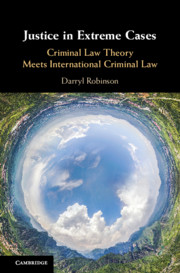Book contents
- Justice in Extreme Cases
- Justice in Extreme Cases
- Copyright page
- Contents
- Acknowledgements
- Cases, Statutes, and Other Authorities
- Abbreviations
- Part I Introduction and Problem
- Part II Proposed Solution: A Humanist, Coherentist, Deontic Account
- 3 The Humanity of Criminal Justice
- 4 Fundamentals without Foundations
- 5 Criminal Law Theory in Extremis
- Part III Illustration through Application
- Book part
- Glossary of Selected Terms
- Bibliography
- Index
5 - Criminal Law Theory in Extremis
from Part II - Proposed Solution: A Humanist, Coherentist, Deontic Account
Published online by Cambridge University Press: 17 December 2020
- Justice in Extreme Cases
- Justice in Extreme Cases
- Copyright page
- Contents
- Acknowledgements
- Cases, Statutes, and Other Authorities
- Abbreviations
- Part I Introduction and Problem
- Part II Proposed Solution: A Humanist, Coherentist, Deontic Account
- 3 The Humanity of Criminal Justice
- 4 Fundamentals without Foundations
- 5 Criminal Law Theory in Extremis
- Part III Illustration through Application
- Book part
- Glossary of Selected Terms
- Bibliography
- Index
Summary
In this chapter, I outline how the approach I have can raise new questions, both for ICL and for general criminal law theory.
The study of extreme cases can unsettle and refine our understandings of the principles developed in everyday experience. I will show how studying ICL problems may require us to unpack the roles traditionally played by ‘the State’ in criminal law thinking, and to re-examine many familiar tools of criminal law thought (such as ‘community’, ‘citizenship’ and ‘authority’). The criminal law theory of ICL might draw on ‘cosmopolitanist’ scholarship, which contemplates forms of governance other than the state, and which is therefore particularly challenging for mainstream criminal law thinking.
I will also highlight ‘promising problems’ in ICL. Exploring such problems can help us refine ICL doctrines and also make contributions to mainstream criminal law theory. These include: legality without a legislature; a humanistic account of duress and social roles; and superior orders and state authority. I will then do an even deeper delve into a selected set of controversies in Chapters 6 to 8, in order to demonstrate the method at work and thereby clarify the method, the work it can do, and the themes it raises.
Keywords
- Type
- Chapter
- Information
- Justice in Extreme CasesCriminal Law Theory Meets International Criminal Law, pp. 119 - 138Publisher: Cambridge University PressPrint publication year: 2020

